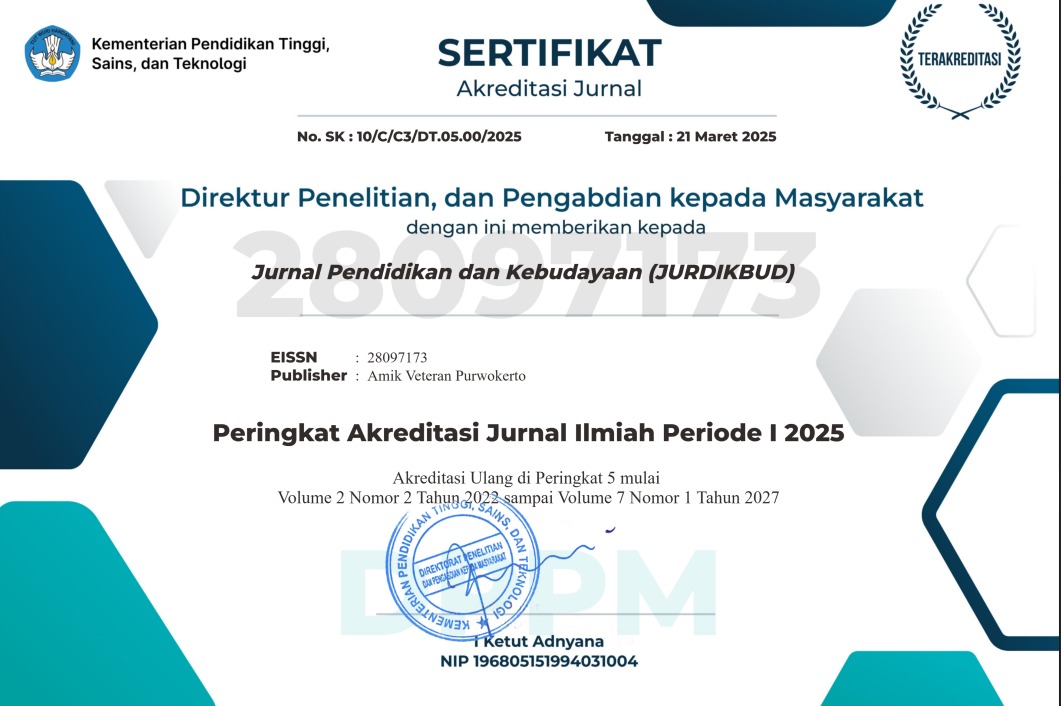Analisis Aksiologi Terhadap Kepemimpinan Transformasional Kepala Sekolah Dalam Perspektif Filsafat Pendidikan
DOI:
https://doi.org/10.55606/jurdikbud.v5i2.7147Keywords:
Axiology, Transformational Leadership, Educational Ethics, Aksiologi, Kepemimpinan Transformasional, Etika PendidikanAbstract
Transformational leadership has become a leadership style that emphasizes change, inspiration, and empowerment. The transformational leadership style carried out by the principal has not yet gone hand in hand with the underlying values. This study aims to analyze the transformational leadership of the principal in the perspective of axiological philosophy. Especially related to ethical and aesthetic values in decision making and teacher coaching. This study uses a qualitative approach method with the principal as the subject of research. And using literature study techniques from various references on educational philosophy and leadership management. Data were collected through participatory observation and school administrative documentation. The results of the analysis show that the axiology of transformational leadership emphasizes the importance of human values, justice, empathy, and beauty in forming a transformative and humanistic school climate. By integrating the philosophy of axiology, the principal's leadership is not only oriented towards achieving targets, but also forming the character and culture of the school that is meaningful morally and aesthetically. This finding confirms that the integration between the philosophy of values and transformative leadership is not only theoretically ideal, but also real in practice in the field of education.
References
Ainia, D. K. (2020). Merdeka Belajar Dalam Pandangan Ki Hadjar Dewantara Dan Relevansinya Bagi Pengembanagan Pendidikan Karakter. Jurnal Filsafat Indonesia, 3(3), 95–101. https://doi.org/10.23887/jfi.v3i3.24525
Bass, B. M. (2006). Transformasional Leadership. In Paper Knowledge . Toward a Media History of Documents.
Burns, J. M. (1978). Leadership and followership. Leadership, 18-23.
Creswell, J. W., & Poth, C. N. (2018). Qualitative inquiry and research design: Choosing among five approaches (4th ed.). SAGE Publications.
Florianus Geong. (2021). Pengaruh Gaya Kepemimpinan Kepala Sekolah Dan Motivasi Kerja Terhadap Kinerja Guru. JAPB: Jurnal Agama, Pendidikan Dan Budaya, 2(1), 43–58. https://doi.org/10.56358/japb.v2i1.70
Haryanto, M., & Muslichah, I. (2021). Kepemimpinan etis kepala sekolah dalam meningkatkan loyalitas guru. Jurnal Pendidikan Karakter, 11(2), 123–135.
Hermanto, A., & Winarti, D. (2022). Empati dan keadilan dalam kepemimpinan kepala sekolah. Jurnal Kepemimpinan Pendidikan, 10(1), 78–90
Krippendorff, K. (2018). Content analysis: An introduction to its methodology (3rd ed.). SAGE Publications.
Miles, M. B., Huberman, A. M., & Saldaña, J. (2020). Qualitative data analysis: A methods sourcebook (4th ed.). SAGE Publications.
Noddings, N. (2020). Philosophy of education (4th ed.). Routledge
Putri, M. A., & Kurniawan, H. (2022). Pengaruh estetika lingkungan belajar terhadap motivasi siswa. Jurnal Psikologi Pendidikan dan Pembelajaran, 11(1), 34–42.
Rahmadani, E., Armanto, D., Syafitri, E., & Umami, R. (2021). Ontologi, Epistemologi, Aksiologi Dalam Pendidikan Karakter. Journal of Science and Social Research, 4(3), 307. https://doi.org/10.54314/jssr.v4i3.680
Suwarlan, Erlan., dkk. (2023). Filsafat Ilmu. Purbalingga: Eureka Media Aksara
Suyatno, S., Sukartiningsih, W., & Mubarok, H. (2021). Kepemimpinan nilai dan pembentukan budaya sekolah humanis. Jurnal Ilmu Pendidikan, 27(3), 112–122.
Tjakraatmadja, J. H., & Aulia, D. (2021). Kepemimpinan berbasis nilai dalam organisasi pendidikan. Jurnal Organisasi dan Manajemen Pendidikan, 5(2), 102–116.
Downloads
Published
How to Cite
Issue
Section
License
Copyright (c) 2025 Jurnal Pendidikan dan Kebudayaan (JURDIKBUD)

This work is licensed under a Creative Commons Attribution-ShareAlike 4.0 International License.








